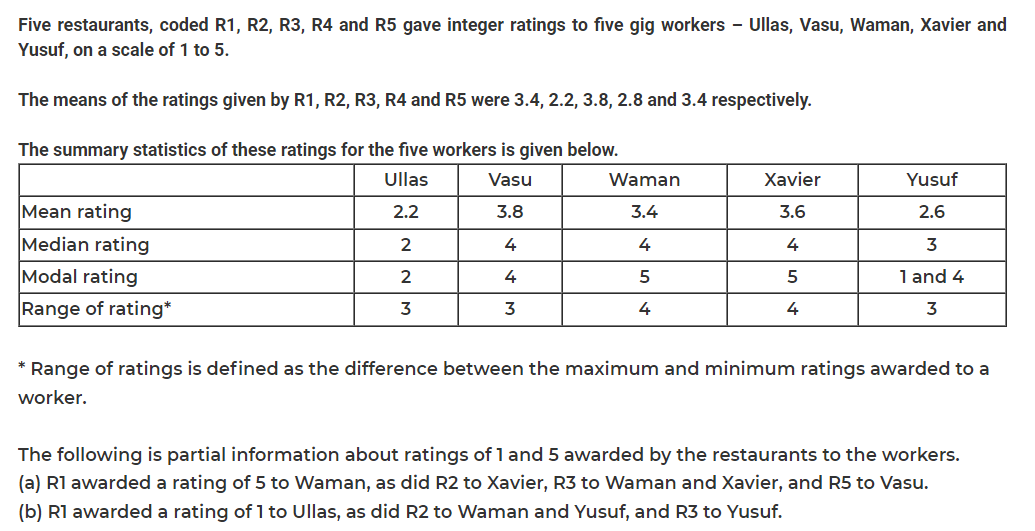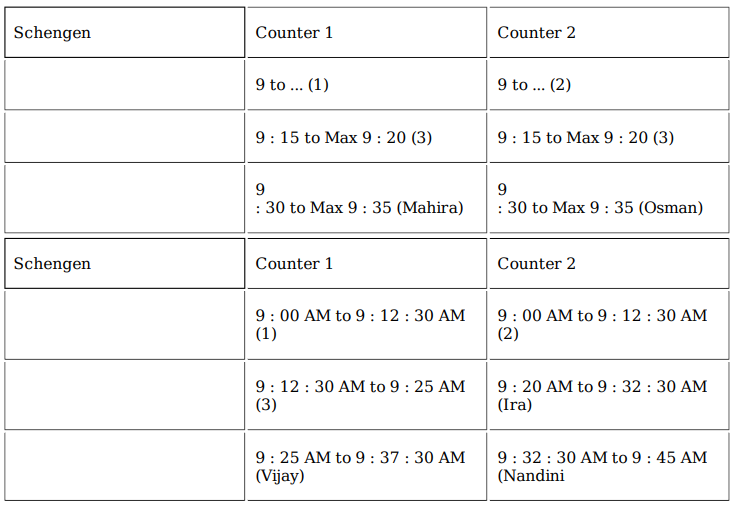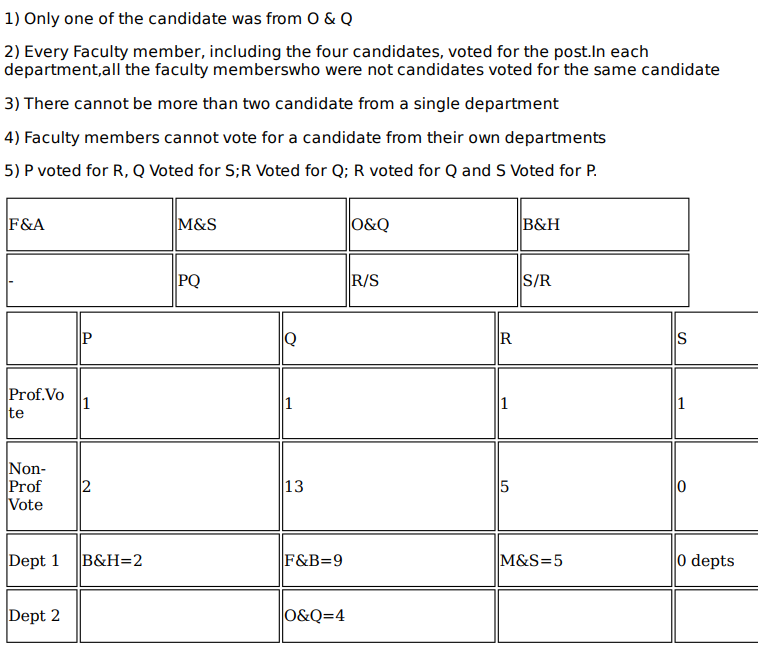Live Updates
• CATKing has launched new chat bot.

• New video on Logs has been released.
13.2K
Learners
asked the doubt

Previous Year Questions
How many times do the teams pass through Station B in a day?
Video Explanation

Which team patrols the street connecting Stations D and E at 10:15 hrs?
Video Explanation

An air conditioner (AC) company has four dealers – D1, D2, D3 and D4 in a city. It is evaluating sales performances of these dealers. The company sells two variants of ACs – Window and Split. Both these variants can be either Inverter type or Non-inverter type. It is known that of the total number of ACs sold in the city, 25% were of Window variant, while the rest were of Split variant. Among the Inverter ACs sold, 20% were of Window variant.
The following information is also known: 1. Every dealer sold at least two window ACs.
2. D1 sold 13 inverter ACs, while D3 sold 5 Non-inverter ACs. 3. A total of six Window Non-inverter ACs and 36 Split Inverter ACs were sold in the city.4. The number of Split ACs sold by D1 was twice the number of Window ACs sold by it.5. D3 and D4 sold an equal number of Window ACs and this number was one-third of the number of similar ACs sold by D2.6. D2 and D3 were the only ones who sold Window Non-inverter ACs. The number of these ACs sold by D2 was twice the number of these ACs sold by D3.
7. D3 and D4 sold an equal number of Split Inverter ACs. This number was half the number of similar ACs sold by D2.
How many Split Inverter ACs did D2 sell?
Video Explanation

What percentage of ACs sold were of Non-inverter type?
Video Explanation

What was the total number of ACs sold by D2 and D4?
Video Explanation

Which of the following statements is necessarily false?
Video Explanation

If D3 and D4 sold an equal number of ACs, then what was the number of Non-inverter ACs sold by D2?
Video Explanation

How many Split Inverter ACs did D2 sell?
Video Explanation

What percentage of ACs sold were of Non-inverter type?
Video Explanation

What was the total number of ACs sold by D2 and D4?
Video Explanation

Which of the following statements is necessarily false?
Video Explanation

If D3 and D4 sold an equal number of ACs, then what was the number of Non-inverter ACs sold by D2?
Video Explanation

What was the number of online registrations in January?
Video Explanation

Which of the following statements can be true?
I. The number of offline registrations was the smallest in May.
II. The total number of registrations was the smallest in February.
Video Explanation

What best can be concluded about the number of offline registrations in February?
Video Explanation

In a coaching class, some students register online, and some others register offline. No student registers both online and offline; hence the total registration number is the sum of online and offline registrations. The following facts and table pertain to these registration numbers for the five months – January to May of 2023. The table shows the minimum, maximum, median registration numbers of these five months, separately for online, offline and total number of registrations. The following additional facts are known.
1. In every month, both online and offline registration numbers were multiples of 10.
2. In January, the number of offline registrations was twice that of online registrations.
3. In April, the number of online registrations was twice that of offline registrations.
4. The number of online registrations in March was the same as the number of offline registrations in February.
5. The number of online registrations was the largest in May.
What was the total number of registrations in April?
Video Explanation

What was the number of online registrations in January?
Video Explanation

Which of the following statements can be true?
I. The number of offline registrations was the smallest in May.
II. The total number of registrations was the smallest in February.
Video Explanation

What best can be concluded about the number of offline registrations in February?
Video Explanation

What was the total number of registrations in April?
Video Explanation

What was the maximum aggregate score obtained by the students?
Video Explanation

What was Mathew's score in the test?
Video Explanation

Which of the following pairs of students were part of the same project team?
i) Amala and Biman
ii) Koli and Mathew
Video Explanation

What was Rini's score in the project?
Video Explanation

There are only three female students – Amala, Koli and Rini – and only three male students – Biman, Mathew and Shyamal – in a course. The course has two evaluation components, a project and a test. The aggregate score in the course is a weighted average of the two components, with the weights being positive and adding to 1.
The projects are done in groups of two, with each group consisting of a female and a male student. Both the group members obtain the same score in the project.
The following additional facts are known about the scores in the project and the test.
1. The minimum, maximum and the average of both project and test scores were identical – 40, 80 and 60, respectively.
2. The test scores of the students were all multiples of 10; four of them were distinct and the remaining two were equal to the average test scores.
3. Amala's score in the project was double that of Koli in the same, but Koli scored 20 more than Amala in the test. Yet Amala had the highest aggregate score.
4. Shyamal scored the second highest in the test. He scored two more than Koli, but two less than Amala in the aggregate.
5. Biman scored the second lowest in the test and the lowest in the aggregate.
6. Mathew scored more than Rini in the project, but less than her in the test.
What was Rini's score in the project?
Video Explanation

What was the maximum aggregate score obtained by the students?
Video Explanation

What was Mathew's score in the test?
Video Explanation

Which of the following pairs of students were part of the same project team?
i) Amala and Biman
ii) Koli and Mathew
Video Explanation

A visa processing office (VPO) accepts visa applications in four categories – US, UK, Schengen, and Others. The applications are scheduled for processing in twenty 15-minute slots starting at 9:00 am and ending at 2:00 pm. Ten applications are scheduled in each slot.
There are ten counters in the office, four dedicated to US applications, and two each for UK applications, Schengen applications and Others applications. Applicants are called in for processing sequentially on a first-come-first-served basis whenever a counter gets freed for their category. The processing time for an application is the same within each category. But it may vary across the categories. Each US and UK application requires 10 minutes of processing time. Depending on the number of applications in a category and time required to process an application for that category, it is possible that an applicant for a slot may be processed later.
On a particular day, Ira, Vijay and Nandini were scheduled for Schengen visa processing in that order. They had a 9:15 am slot but entered the VPO at 9:20 am. When they entered the office, exactly six out of the ten counters were either processing applications, or had finished processing one and ready to start processing the next.
Mahira and Osman were scheduled in the 9:30 am slot on that day for visa processing in the Others category.
The following additional information is known about that day.1. All slots were full.2. The number of US applications was the same in all the slots. The same was true for the other three categories.3. 50% of the applications were US applications.4. All applicants except Ira, Vijay and Nandini arrived on time.5. Vijay was called to a counter at 9:25 am.
How many UK applications were scheduled on that day?
Video Explanation

Which of the following is the closest to the time when Nandini's application process got over?
Video Explanation

When did the application processing for all US applicants get over on that day?
Video Explanation

How many UK applications were scheduled on that day?
Video Explanation

Which of the following is the closest to the time when Nandini's application process got over?
Video Explanation

When did the application processing for all US applicants get over on that day?
Video Explanation


How many individual ratings cannot be determined from the above information?
Video Explanation

To how many workers did R2 give a rating of 4?
Video Explanation

What rating did R1 give to Xavier?
Video Explanation

What is the median of the ratings given by R3 to the five workers?
Video Explanation

Which among the following restaurants gave its median rating to exactly one of the workers?
Video Explanation

How many individual ratings cannot be determined from the above information?
Video Explanation

To how many workers did R2 give a rating of 4?
Video Explanation

What rating did R1 give to Xavier?
Video Explanation

What is the median of the ratings given by R3 to the five workers?
Video Explanation

Which among the following restaurants gave its median rating to exactly one of the workers?
Video Explanation

Faculty members in a management school can belong to one of four departments – Finance and Accounting (F&A), Marketing and Strategy (M&S), Operations and Quants (O&Q) and Behaviour and Human Resources (B&H). The numbers of faculty members in F&A, M&S, O&Q and B&H departments are 9, 7, 5 and 3 respectively.
Prof. Pakrasi, Prof. Qureshi, Prof. Ramaswamy and Prof. Samuel are four members of the school's faculty who were candidates for the post of the Dean of the school. Only one of the candidates was from O&Q.
Every faculty member, including the four candidates, voted for the post. In each department, all the faculty members who were not candidates voted for the same candidate. The rules for the election are listed below.
1. There cannot be more than two candidates from a single department.
2. A candidate cannot vote for himself/herself.
3. Faculty members cannot vote for a candidate from their own department.
After the election, it was observed that Prof. Pakrasi received 3 votes, Prof. Qureshi received 14 votes, Prof. Ramaswamy received 6 votes and Prof. Samuel received 1 vote. Prof. Pakrasi voted for Prof. Ramaswamy, Prof. Qureshi for Prof. Samuel, Prof. Ramaswamy for Prof. Qureshi and Prof. Samuel for Prof. Pakrasi.
Which two candidates can belong to the same department?
Video Explanation

Which of the following can be the number of votes that Prof. Qureshi received from a single department?
Video Explanation

If Prof. Samuel belongs to B&H, which of the following statements is/are true?
Statement A: Prof. Pakrasi belongs to M&S.
Statement B: Prof. Ramaswamy belongs to O&Q.
Video Explanation

What best can be concluded about the candidate from O&Q?
Video Explanation

Which of the following statements is/are true?
Statement A: Non-candidates from M&S voted for Prof. Qureshi.
Statement B: Non-candidates from F&A voted for Prof. Qureshi.
Video Explanation

Which two candidates can belong to the same department?
Video Explanation

Which of the following can be the number of votes that Prof. Qureshi received from a single department?
Video Explanation

If Prof. Samuel belongs to B&H, which of the following statements is/are true?
Statement A: Prof. Pakrasi belongs to M&S.
Statement B: Prof. Ramaswamy belongs to O&Q.
Video Explanation

What best can be concluded about the candidate from O&Q?
Video Explanation

Which of the following statements is/are true?
Statement A: Non-candidates from M&S voted for Prof. Qureshi.
Statement B: Non-candidates from F&A voted for Prof. Qureshi.
Video Explanation

Previous year papers
2024
2023
2022
2021
2020
2019
2018




































































